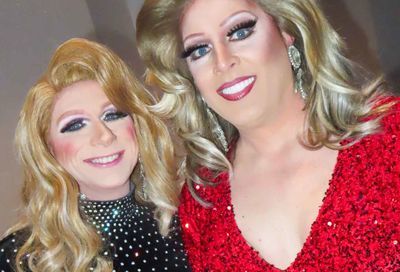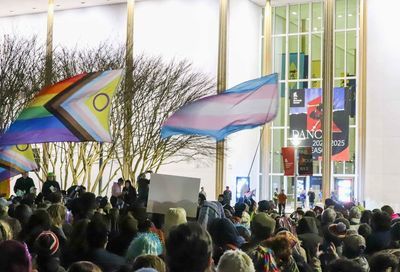World Cup Host Qatar Criticized for Anti-LGBTQ Human Rights Abuses
Middle Eastern nation criticized for its laws criminalizing homosexuality and its unlawful detentions of LGBTQ people.

As Qatar prepares to host the FIFA World Cup, the top global soccer competition held every four years, the Middle Eastern nation is coming under fire for alleged violations of human rights and its hostility towards LGBTQ individuals.
Homosexuality is criminalized in Qatar, a Muslim-majority nation that adheres to Sharia law, with prison sentences of up to seven years handed out for instances of same-sex activity. Despite concerns about this, as well as other human rights concerns, such as the treatment of women and the continued mistreatment of migrant workers, FIFA members looked the other way and voted to award the 2022 World Cup to Qatar — which will be the first Middle Eastern country to host the tournament starting this upcoming weekend — back in 2010.
Both the Qatari government and FIFA, the international governing body of soccer, have received criticism over the country’s spotty human rights record, and for attempting to “paper over” the controversy by paying so-called “ambassadors,” like former British soccer star David Beckham, who will appear publicly to extol the virtues of international sports bringing countries together, celebrate, he historic nature of the tournament for Middle Eastern nations, and hype up the forthcoming tournament.
Due to Qatar’s harsh anti-LGBTQ laws, a majority of people in Great Britain, or 62%, believe Qatar’s stance on LGBTQ rights alone should have been enough to bar it from hosting the World Cup, with majorities of every age group, gender, and political persuasion agreeing with that sentiment, according to a poll by Public First on behalf of More in Common, an organization that seeks to combat societal polarization.
The survey, conducted between Nov. 1-3, also asked more than 2,000 Britons whether Keir Starmer, the leader of Britain’s minority Labour Party, was right to boycott the tournament over Qatar’s abysmal record on LGBTQ rights, finding that 69% of respondents supported Starmer’s stance on the issue, reports The Guardian.
The tournament, which was rescheduled to November in order to avoid Qatar’s brutal summer temperatures and the host of heat-related issues that could pose a threat to players, kicks off on Nov. 20, with Qatar facing Ecuador in the first match.
Besides its laws criminalizing homosexuality, critics point to the country’s alleged mistreatment of migrant workers, many of whom lived in virtual slavery under the since-abolished kafala system, in which foreign-born workers were unable to change jobs without express permission of their individual employers, leaving them vulnerable to exploitation, and, in some cases, forced labor without pay.
Human rights advocates have reported that approximately 6,500 migrant workers — primarily from South Asia — have died in Qatar from 2011 to 2020, including at least 37 who died while in the country to help construct various stadiums around the capital city of Doha for the World Cup, although the government claims that only three actually died while on the job.
According to Amnesty International, there has been insufficient research into the thousands of deaths of migrant workers in the construction industry and the contribution played by extreme heat in those deaths. The organization has also noted that domestic workers — the majority of whom are women — and private security sector employees are particularly vulnerable to forced labor and other forms of abuse.

With regard to LGBTQ rights, the nonprofit Human Rights Watch issued a report last month that Qatari Preventive Security Department forces have arbitrarily arrested LGBTQ people on the basis of their perceived gender expression and subjected them to abuse while in detention.
Human Rights Watch documented several cases of severe and repeated beatings and at least five incidents of sexual assault. Some of those detainees reported that security officers forced them to unlock their phones and took screenshots of private pictures and chats from their devices, as well as the contact information of other LGBTQ people.
According to The Guardian, a U.S.-based Qatari doctor who is familiar with many LGBTQ individuals still in the country claims that security forces have enlisted the help of some gay Qataris, who have been promised they will not be tortured if they help authorities track down and entrap other LGBTQ people in the country. Dr. Nasser Mohamed told the British newspaper that gay foreign fans would likely not be persecuted while attending World Cup festivities, but that local LGBTQ Qataris have to live in fear of constantly being outed, including by fellow community members.
Recently, a Filipino migrant worker using the pseudonym “Ali,” who worked in the country in 2018, told the British news outlet the i that security forces allegedly entrapped and gang-raped him in a Doha hotel.
According to Ali, he met a Turkish man online who offered him 70 Euro to have sex with him While Ali told the i that he had never before engaged in sex for money, he wanted to earn additional money to send home to support his family.
But when he arrived at the hotel room, six security officers were waiting for him. They began raping him, with one officer slapping him afterwards when he was crying. He was taken to jail and later deported back to the Philippines, with officials revoking all of his work permits. Advocates have since claimed Ali’s experience is not unique, and demonstrates the brutality with which Qatari security forces hunt down people suspected of violating the country’s laws prohibiting homosexuality.
Concerns have also been raised about the safety of gay fans who may travel to the World Cup, or fans who may show solidarity by carrying a rainbow flag, for example, even as Qatari officials continue to claim that all fans are welcome. Nasser al Khater, the chief executive officer of the 2022 tournament, said that while Qatar will not change its laws criminalizing homosexuality, no visitors will face discrimination during the 29-day tournament.
The United Kingdom’s foreign secretary, recently experience backlash after urging LGBTQ fans to show respect to Qatari traditions during an interview with Sky News.
“These are Muslim countries. They have a very different cultural starting point from us. It is important when you are a visitor to a country that you respect the culture of your host nation,” Cleverly said, while also claiming that British officials do talk to Middle Eastern nations about their own values related to freedom and tolerance.
In response to Cleverly’s comments about “respect,” the TV presenter and former soccer star Gary Lineker tweeted: “Whatever you do, don’t do anything Gay. Is that the message?”
Lucy Powell, the shadow sport secretary for the Labour Party, called Cleverly’s comments “shockingly tone-deaf,” adding: “The government should be challenging FIFA on how they’ve put fans in this position, and ensuring the full safety of all fans attending, not defending discriminatory values.”
The controversy over Qatar’s anti-LGBTQ policies was revived after recent comments by Qatar FIFA World Cup ambassador and former soccer star Khalid Salman that appeared to show him calling homosexuality damaging.
“Let’s talk about gays,” Salman reportedly said during an interview with the German news station ZDF. “The most important thing is, everybody will accept that they come here. But they will have to accept our rules.”
He added that he was concerned that children might see two gay men together, and learn “something that is not good.”
During that interview, Salman allegedly referred to homosexuality as “haram,” or forbidden under Islamic law. When asked why by the interviewer, Salman responded: “I am not a strict Muslim but why is it haram? Because it is damage in the mind.” The interview, filmed two weeks ago, was immediately stopped by an official from the World Cup organizing committee.
Salman has since accused ZDF of misrepresenting his comments, saying they were taken out of context.
“Intoxicants and alcohol came up, and I said they were very harmful to the mind. The journalist misunderstood what I said and reported that I was referring to homosexuality — based on his own interpretation, or maybe intentions,” Salman said in a video posted online. An extended video clip of the interview appears to create uncertainty around whether Salman was indeed referring to alcohol or homosexuality, reports Australian outlet SBS World News.
Support Metro Weekly’s Journalism
These are challenging times for news organizations. And yet it’s crucial we stay active and provide vital resources and information to both our local readers and the world. So won’t you please take a moment and consider supporting Metro Weekly with a membership? For as little as $5 a month, you can help ensure Metro Weekly magazine and MetroWeekly.com remain free, viable resources as we provide the best, most diverse, culturally-resonant LGBTQ coverage in both the D.C. region and around the world. Memberships come with exclusive perks and discounts, your own personal digital delivery of each week’s magazine (and an archive), access to our Member's Lounge when it launches this fall, and exclusive members-only items like Metro Weekly Membership Mugs and Tote Bags! Check out all our membership levels here and please join us today!
























You must be logged in to post a comment.